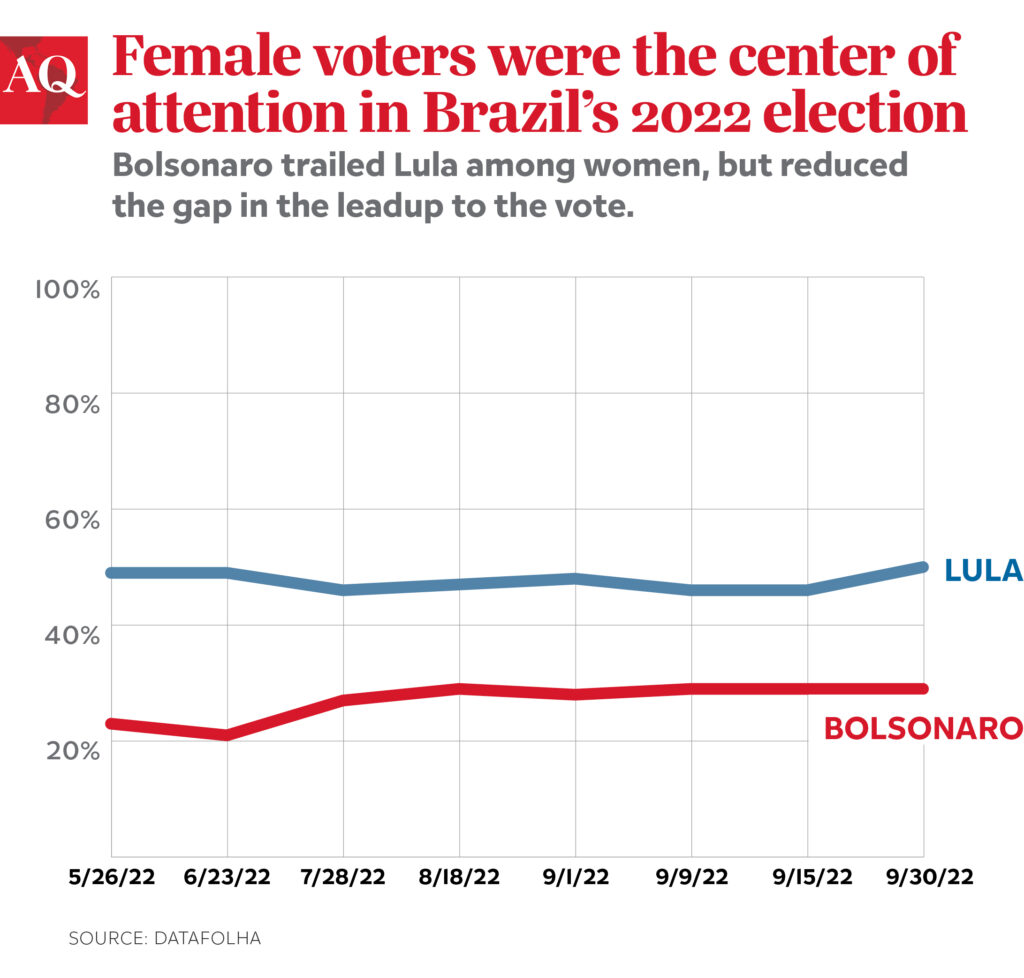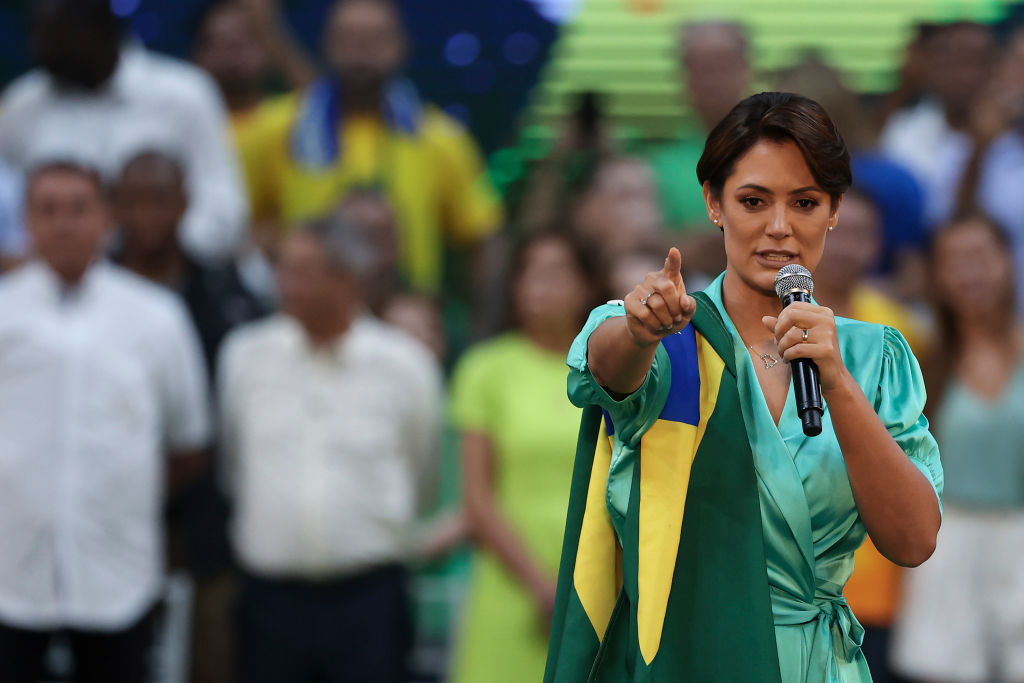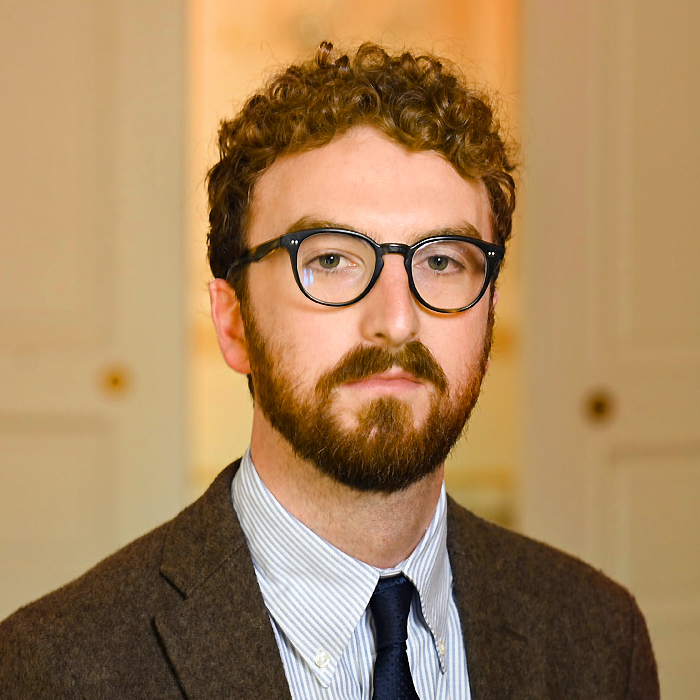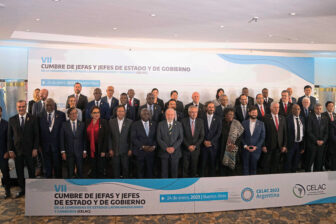In the months prior to Brazil’s 2022 presidential election, polls showed Jair Bolsonaro trailing Luiz Inácio Lula da Silva by as many as 30 percentage points among women. Worried, his campaign deployed its ace in the hole: Michelle Bolsonaro, the president’s young, photogenic wife, a devout evangelical who until that point had a limited public profile.
In July, drawing heavily on Christian themes, she delivered a rousing speech in Rio de Janeiro that brought Bolsonaro, standing behind her, to tears.
“His campaign rescued patriotism, it answered the call,” Michelle Bolsonaro said of her husband. “He is one of God’s chosen ones, he has a clean, pure heart—and he’s handsome, huh? But he’s mine.”
The speech was a hit—and Michelle Bolsonaro was credited with helping bring her husband within striking distance in the runoff election (he lost by less than two percentage points).

That success on the campaign trail has also prompted speculation about her own political future. Jair Bolsonaro faces more than a dozen court challenges, which he and several allies have acknowledged may render him ineligible to run again for the presidency in 2026. Though Michelle Bolsonaro has also faced past allegations of wrongdoing, including questions about whether she was involved in an attempt to improperly keep a gift from the king of Saudi Arabia of jewels and other luxury goods worth millions, some say she is a natural future leader of Brazil’s conservative movement.
There is plenty of competition for the throne. Some comes from within her own family: Three of Bolsonaro’s sons are elected officials with large social media followings. Brazil’s three largest states are also governed by conservatives, including São Paulo Governor Tarcísio de Freitas, who has already won enthusiastic backing from some business leaders as a future candidate for the presidency. But Michelle Bolsonaro appears to enjoy support among everyday Brazilians, many of whom remember favorably her husband’s emphasis on “defending the family,” and see her as a potentially less divisive figure. A recent opinion column in a major Brazilian newspaper bore the provocative title: “Bolsonaro, Michelle’s first gentleman.”
Sóstenes Cavalcante, a federal deputy for Rio de Janeiro, a member of the Bolsonaros’ Liberal Party and one of the leaders of the evangelical caucus in Congress, said that if the former first lady were to decide to run for office, and had her family’s backing, she would be a “very strong candidate” for any position.
“She can help enormously … in giving the Brazilian right a female strength equal to that of the left,” he told AQ.
A humble background
Reports in the Brazilian press describe Michelle Bolsonaro’s childhood in a small house in Ceilândia Norte, on the poor outskirts of Brasília. Her grandmother, now in fragile health and living in Sol Nascente, Brazil’s largest favela, was caught by police selling drugs in downtown Brasília in 1997, when Michelle was 15.
Michelle Bolsonaro has not spoken in much detail about her past. Neither her grandmother nor her mother were invited to Bolsonaro’s inauguration. She became active in evangelical church life and found work as a secretary in Brazil’s house of deputies. Across the hall she met Jair Bolsonaro, nearly 30 years her senior, still a little-known congressman from Rio in 2007. He invited her to work in his office, and they married in a civil ceremony later that year—Jair’s third marriage. Michelle, too, has a daughter from a previous relationship.
The full, religious ceremony took place in 2013, and—significantly—was presided over by Silas Malafaia, the powerful evangelical leader of the Assembleia de Deus church. While Michelle is evangelical, Jair was, and remains, a Catholic, despite close connections to evangelicals that analysts say his wife played an important part in helping build.
“Michelle was the one responsible for introducing Bolsonaro to evangelical leadership,” Guilherme Casarões, a professor at Fundação Getúlio Vargas who has conducted deep research on the Brazilian right, told AQ. “Up until 2015, [Bolsonaro’s] military identity was much stronger than his Christian identity.”
If Michelle often shied from the public stage during her husband’s presidency, she was reported to have exercised influence behind the scenes, including on major government appointments, such as the choice of Damares Alves as minister for women, families and human rights, as well as of Presbyterian pastor André Mendonça as one of Bolsonaro’s picks for the Supreme Court. Alves, now a senator, became one of the most prominent evangelicals in Bolsonaro’s administration.
But there was also talk of Michelle Bolsonaro’s involvement in internal clashes within the Bolsonaro clan. After the election, many noted that Michelle and Jair Bolsonaro had ceased to follow each other on Instagram, where Michelle has a loyal following of 6 million. Jair Bolsonaro’s social media presence was understood to be run by his son Carlos, whose relationship with Michelle Bolsonaro was said to be tense at moments during the campaign.

Observers emphasized the powerful political potential that emanates from Michelle Bolsonaro’s status as a relatable woman of evangelical faith who represents a more traditional notion of gender roles than that put forward by the left.
“She’s an authentic evangelical figure,” said Lívia Reis, a researcher at the Instituto de Estudos da Religião. “She is from humble origins and has a super problematic family … but nonetheless she became first lady of Brazil.”
Detractors often see some aspects of Michelle Bolsonaro’s personal past as forming a contradiction with the traditional family values of the Brazilian right. But for Reis, her evangelical supporters don’t necessarily see it that way.
“When you convert to the Gospel, you give rise to a new person, you break with the person you were before,” Reis said.
Questions over Saudi jewels
Michelle Bolsonaro is currently serving as the president of PL Mulher, the women’s wing of the party under whose ticket Bolsonaro ran in 2022.
From that position, she may be able to help the Brazilian right craft a platform and message that are less objectionable to Brazil’s female voters. Jair Bolsonaro’s stance on expanding access to guns was rejected by 82% of Brazilian women. Michelle Bolsonaro might be more prone to focus on conservative views on gender, sexuality and abortion, issues where polls indicate the electorate is more supportive.
There are hurdles. Michelle Bolsonaro still faces questions over the nature of deposits made to her bank account by a former advisor of Bolsonaro’s son Flávio, first revealed in 2020. And she has been caught up in an ongoing scandal over a set of gifts from the king of Saudi Arabia. One package worth $3.25 million, including a diamond necklace, ended up in customs after agents found it in the luggage of an aide to the then-mining minister; Bolsonaro’s envoys made several attempts to reclaim the goods prior to the end of Bolsonaro’s term, one captured on video.
Michelle Bolsonaro has denied any wrongdoing. In response to the scandal, she posted an unusually ironic response on Instagram: “They want to say that ‘I have all this’ and I didn’t know? My God!”
Her political polish may still need some work. She said at an event on May 6 that she wanted to end a 30% quota for women running for Congress, but quickly retracted her statement after an uproar.
Opposition to any future political plans may also come from her husband. Jair Bolsonaro downplayed his wife’s political ambitions in late March, saying she “didn’t have the experience” to run for executive office, but wanted to continue “collaborating” in politics. But more recently, he suggested both he and Michelle might both run for Senate seats in 2026.
One thing is clear: Michelle Bolsonaro has prospects in Brazilian politics. The unanswered question is whether she will try to make use of them.









